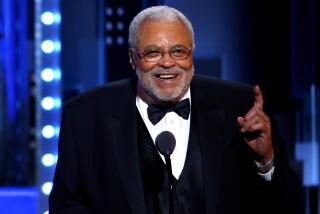The truth will out in muddled political thriller ‘Mr. Jones’
- Share via
Early in the historical political thriller “Mr. Jones,” a senior advisor to British politician David Lloyd George counsels that “Herr Hitler will soon learn there’s a great deal of difference between holding a rally and running a country.”
The year is 1933 and the words are spoken derisively to Gareth Jones, a young Welsh journalist just back from interviewing the newly appointed German Chancellor Adolf Hitler and his propaganda minister, Joseph Goebbels. It’s a chilling rejoinder, especially given the current state of U.S. and world politics.
As a foreign affairs advisor to the still powerful Lloyd George, whose tenure as Britain’s last liberal prime minister ended in 1922, Jones (earnestly played by James Norton) has cautioned his elder colleagues not to underestimate Germany’s ambitions and that their only hope is an alliance with Russia’s Josef Stalin. But with the global economy a shambles, his warnings go unheeded.
Determined to interview Stalin and find the truth behind the Soviet Union’s purported economic vitality despite the weak ruble and worldwide despair, Jones travels to Moscow.
“Mr. Jones” feels like several potentially good movies unsuccessfully merged to form a lesser one. Director Agnieska Holland (“Europa Europa”) and screenwriter Andrea Chalupa obscure Jones’ epic pursuit of a story, overloading it with stylistic and narrative shifts and flourishes. The events depicted cover months, but in the film’s first hour it feels like years.
The sequences in Moscow, where Jones finds himself down a rabbit hole of Jazz age decadence, corruption and baffling bureaucracy, are staged as noir mystery with Vanessa Kirby as a femme fatale-like fellow journalist and Peter Sarsgaard as the duplicitous Walter Duranty, the New York Times’ Pulitzer Prize-winning bureau chief.
It’s all handsomely mounted, but there’s a deadly loss of urgency. It’s only when Jones flees the city, determined to investigate rumors of famine in Ukraine, where his mother was once a teacher, that the film regains its momentum.
Once in the countryside, he is confronted by mass starvation. The bleak, brutal landscape, desaturated by Holland, numbs his senses and reeks of death. Long, wintry silences pierced by the wail of a hungry child haunt Jones as he bears witness to the horrors of the Holodomor, as it is now known, a man-made event perpetuated by Stalin that killed millions. The experience transforms the already intrepid reporter into a crusader.
The film is bookended with English author Eric Blair — better known as George Orwell — writing his allegorical novella “Animal Farm,” inspired by Jones’ reporting from the Soviet Union. It’s an intriguing concept but needlessly detracts from Jones’ compelling saga (and apparently much of the 20 minutes excised since the film’s premiere at Berlin in 2019 involved the Orwell thread).
Though it’s a shame that “Mr. Jones” is not more cohesive, the remarkable story of Gareth Jones retains its potency. It’s a bracing reminder that we can never allow the advocates of truth to be silenced.
‘Mr. Jones’
In English, Russian, Ukrainian and Welsh with English subtitles
Not rated
Running time: 1 hour, 59 minutes
Playing: Available June 19 on digital platforms, July 3 on VOD
More to Read
Only good movies
Get the Indie Focus newsletter, Mark Olsen's weekly guide to the world of cinema.
You may occasionally receive promotional content from the Los Angeles Times.










